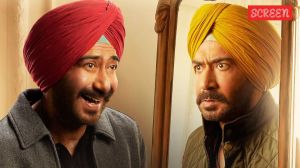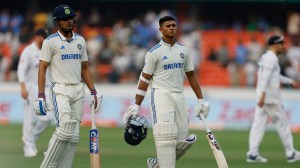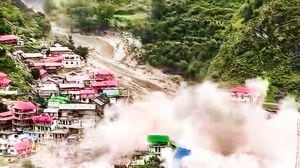Click here to follow Screen Digital on YouTube and stay updated with the latest from the world of cinema.
Nandita Das: It’s important to celebrate Manto and introduce him to youngsters
Filmmaker and actor Nandita Das on her upcoming directorial Manto, which will hit screens on September 20.
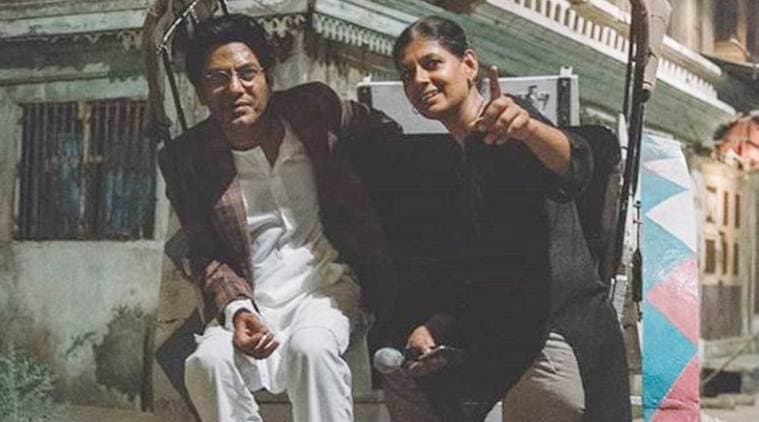 Nandita Das and Nawazuddin Siddiqui on the sets of Manto.
Nandita Das and Nawazuddin Siddiqui on the sets of Manto.
Putting together a 112-minute film on a personality like Saadat Hassan Manto wasn’t an easy task for Nandita Das. In a conversation with indianexpress.com, the Manto director-writer reveals what went into making of the biopic.
Q. You took six years to work on this film. Why did it take so long?
Six years is nothing for a film like this. Now, when I look back, I think I could have done so much more. Manto for me is a response to whatever is happening in the world we are living in. We are being divided on the basis of caste and religion among other things. Manto talks about humanity, through his stories and life, which we are forgetting. I think that is why he is relevant even now. Also, for us artistes and you journalists, there’s a world of fear. Various sorts of censorship have emerged including self-censorship. So, in such times, a person like Manto who is fearless and fought for what’s right all his life, it’s important to celebrate him, to introduce him to the youngsters. He is a reminder to all of us that we don’t need to live in fear and how important it is to fight for our rights. So, Manto is aspirational. I did not put him on a pedestal. I’ve shown his contradictions too. I’ve shown him as normal as everyone between us. We have tried to show him the way he was. He himself had always said that Saadat Hassan might die but Manto will live on forever. So, we are making a contribution in keeping him alive.
Q. Manto’s daughters had come to Mumbai to watch the film. What was the conversation between you and his family?
I met them first in 2013. I started working on the project from May 11, 2012 when it was the centenary celebration of Manto. A lot of people wrote about Manto, be it here or internationally. I was just reading the articles and realised how interesting this person is. It seemed like he is talking about the world of today. I thought a film will be interesting on him. In 2013, I was invited for an event in Lahore and I thought this could be a good chance to meet Manto’s family. Since then these (Manto’s family members and others) people have trusted me so much. I met Zakia (Manto’s second daughter) who told me a lot about Manto. He himself has written so much be it short story, poems, biographical sketches and more that research took a lot of time. And to put all of that in 112-minute feature film was a task. I selected four years of his life – before and after partition- which were extremely important for India and Pakistan, even for Manto. So, it was a difficult process. I met them (Manto family) two-three times to understand the characters a bit closely, to understand Safia, the environment outside and inside their house. When it was being premiered here, it was my wish to bring the family here, to show them their parents on screen. It was quite a nervous moment because it’s a very personal thing for them. I showed Manto in a grey shade. So for them to see their father in such a shade, it was a dare for me. I had also sent second daughter and her husband the script. I wanted them to be comfortable with it. There are fictional elements, but everything is derived from facts. I must say that the authorities helped us a lot. Four people from Lahore came to watch the film.
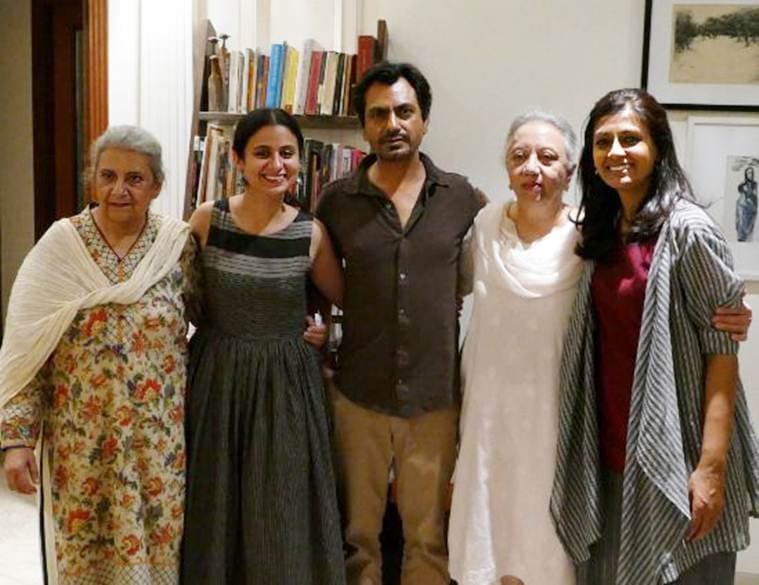 Nandita Das, Nawazuddin Siddiqui and Rasika Duggal with Manto’s daughters.
Nandita Das, Nawazuddin Siddiqui and Rasika Duggal with Manto’s daughters.
When they walked out of the theater, I was satisfied looking at their faces, especially the middle daughter and her husband broke down. So, I think it’s a moving experience. They told me that they felt they were present at their life events. Whatever we lived, heard or experienced, all became real for us through this film. So, I am totally overwhelmed with the response that’s coming in.
Q. Is there a reference to the five stories that got him arrested?
When I was writing the story, from the beginning, it was important to show a glimpse of these stories he had written. Think if I was making a film on a musician, wouldn’t I talk about their music?
We talk about his sensitivity, pity for women and sex workers, how partition affected him, and what sort of stories came out of the partition experience. He used to write his personal and intimate stories. I had to weave those in the film. The challenge is that it was nearly impossible to differentiate reality and fiction in his writing. There has been an effort to be seamless.
Q. There’s a dialogue in the film that says, “If you want freedom to write, then you must also know a writer’s responsibilities.” So, did you have any responsibility?
This dialogue belongs to people who don’t stand for freedom of expression but want to sound intelligent. Yes, writing is a responsibility but not just five people can decide for us and our choices. We will be responsible but it will have its own pros and cons. Freedom doesn’t necessarily have to mean good. But hopefully, time will stand for it and good will survive. That is why art, architecture, music, poetry or even films which are centuries old are still celebrated because they have stood the test of time. My extra responsibility was the fact that I had developed such a close bond with Manto’s family. I was writing about their live, their father. So, I felt I should be responsible to portray their life with great amount of truth and dignity. It meant so much when they hugged me.
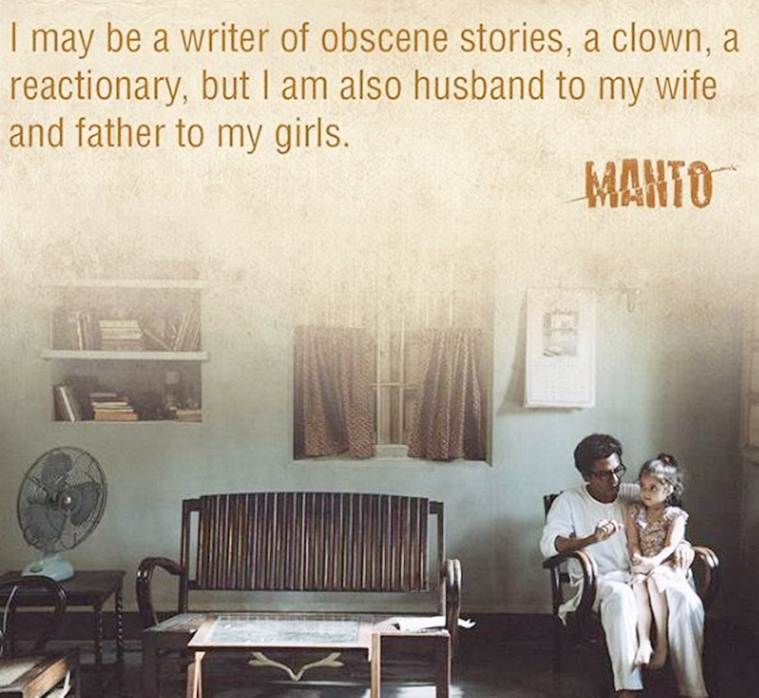
Q. Was there anything that you refrained from exploring while writing the script and making the film?
Strangely Firaaq and Manto are set in times of sectarian violence. I didn’t realise the connection until I finished the film. I am more intrigued about how violence impacts people. The kind of fear people go through. I treated the film the same way. The film is set in the backdrop of partition but we look at it completely from Manto’s perspective.
Q. Manto wrote a lot about women, sometimes objectifying them. Today, there’s a discussion about the same. What do you feel is the difference between what he did and what is happening now?
We call him controversial but I believe anything, even today, worth speaking up, it’s provocative. It’s a word used for me too. When I did Fire and Water, I was tagged as a controversial artiste. Anything which is worth talking about or that makes you push the envelope is considered controversial. Talking about sexuality, the vision of our society and country hasn’t changed much. That’s why I did not want anything to seem titillating because I thought it would do injustice to Manto as he was misunderstood. He was considered a pornographic writer who promotes obscenity. He was accused of obscenity while the story wasn’t even about it. I didn’t touch upon those aspects as I didn’t believe those stories spoke about it. In the stories I’ve taken, I’ve shown spirit rather showing skin or go on that path.
Q. Are you hopeful about Manto’s Pakistan release?
I’m hoping it releases in Pakistan. I am very keen that it does. Manto is a writer who belongs to both India and Pakistan. So, let’s never break him. They are also waiting to see Manto. They already had a release in 2015 which was very different in terms of treatment and the period that they took. So, they are wanting to know how Manto was in Mumbai as that’s the portion they haven’t seen. That film dealt with 1952-55 while mine is based on 1945 to 50. It’s a different interpretation.
Manto releases on September 21.
Photos
- 01
- 02
- 03
- 04
- 05

















